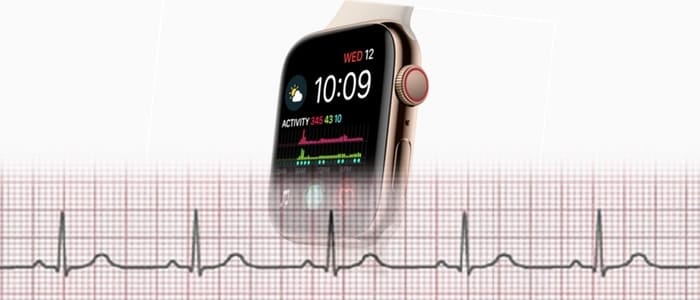The new Apple Watch reportedly comes with new Hermes and Nike wristbands – and more importantly, it is said that it will be able to perform Electrocardiograms (ECGs). Is this the same ECGs we perform at Tel Aviv Doctor Clinic?
The ECG We Perform At Tel Aviv Doctor Clinic
An ECG or Electrocardiogram measures detailed parameters of your heart’s health and performance. An ECG is usually done while laying down and relaxing. To detect certain heart-problems we also arrange for stress-ECGs during a brief ‘workout’. And there is the possibility of long-term ECGs detecting anomalies over hours and days.
With the classic ECG performed at the clinic the electrical impulses of the heart are measured by ten electrodes attached to the body, generating 12 ‘leads’ which are then analyzed and interpreted by our doctors.
Apple Watch As A Medical Device
The Apple Watch has been able to track the heart rate or pulse for years. What is added now, is sensors and software that Apple claims can perform an ECG, including analysis to warn the owner about possible heart problems.
To have an ECG done with the Apple Watch, the person wearing the watch has just to put a finger on the crown of the watch, and wait 30 seconds while the electric measurements are recorded. The result is then analyzed by algorithms which can detect Atrial Fibrillation and possibly other heart problems.
According to Apple CEO Steve Cook’s presentation in Cupertino yesterday, the measurement and the device is FDA approved. Meaning the Apple Watch becomes somewhat of a medical device.
What Is The Benefit Of A Wrist-ECG?
Clearly the Apple watch will not be able to deliver the 12 ‘leads’ of a classic ECG performed in our clinic. But as there are 2 electrodes connected to the wrists in a classic ECG, this is most likely the information the watch will be able to pick up and draw conclusions from. As it is, Atrial Fibrillation or (AFib), a significant risk factor for a stroke, can be detected with just 1 lead.
Business analysts see the main benefit for Apple to appeal to an older population wearing Apple Watch to monitor their heart regularly. “One of the first uses would be to screen for Atrial Fibrillation (“AFib”), a heart rhythm disorder and a common cause of stroke,” writes CNBC. That sounds plausible.
Other heart arrhythmias that can be detected with a classic ECG will most likely be more difficult to track with the watch. And as counter-intuitive as it sounds, signs for a ‘heart-attack’ are not always showing even in a 12-lead ECG.
Potential Problems With The Apple Watch ECG
As with any computer-generated information: the watch-owner will need to discuss the results with a physician, and a proper ECG needs to be administered if there is a suspicion for a heart-problem. Hopefully the watch will be able to alert patients about heart problems that could for example lead to a stroke (in the case of Atrial Fibrillation) – without sending millions of watch-owners into needless frenzy with false-positive results.
In any case, our doctors will be happy to answer your questions about the matter and perform professional guided ECGs in the clinic. If you would like to check your heart ECG, please get in touch by phone (054 941 42 43), email or set a doctor’s appointment online.



